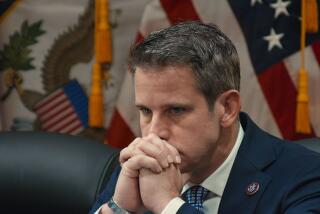Kissinger’s Role in Nixon Era
- Share via
Re “Stone Leaves the Truth on Cutting-Room Floor,” Opinion, Jan. 21: Henry Kissinger is right. “Nixon” is not history. It is a dramatic portrait set against a historical landscape; a film that attempts to interpret a life, to get at the tragedy of a man who shaped an era the historical truth of which remains unsettled. And this latter fact is due in part, at least, to Kissinger’s continuing efforts to revise and reinterpret his own role in that period.
When one compares Kissinger’s own account of the Nixon presidency with those of Walter Isaacson and Seymour Hersh, for example, very different impressions arise. Kissinger raises the question of how one is to know which portions of “Nixon” are imaginary and which are real. Yet a more pressing historical question is: Which portions of Kissinger’s version of Nixon’s White House are self-serving and which are real?
There is a greater truth here that Kissinger wishes to cover up. He argues that Nixon inherited a “real and not imaginary” problem in the American public’s judgment “that, as fought, the (Vietnam) war was unwinnable.” According to even so sympathetic a Nixon biographer as Stephen Ambrose, this was not only the public’s judgment--it was Nixon’s as well. Ambrose states that as early as January 1969, Nixon knew the war could not be won. If that is the case, then fully half of the names on the Vietnam Memorial are those of Americans who died despite that knowledge.
I suspect that Kissinger must have known it, too. Yet both he and President Nixon continued for years to prosecute an unwinnable war, while actively lying to the public about their hopes and aims.
I was not a youth in the “radical wing of the Vietnam protest movement,” as Kissinger states, but a wounded and decorated combat infantryman who volunteered for that war. I do not forget or forgive the deaths of friends that resulted from the Nixon-Kissinger war policy, nor do I forget that Kissinger accepted his Nobel Prize in the shadow of the savage Christmas bombing of Hanoi, and with the deaths of those young men and women on his head.
Kissinger derides as simplistic the “yearning” of a young student in the film that the war be stopped, implying with characteristic hubris that for reasons of practical politics beyond her ken it could not have been. Yet, given that Nixon knew the war could not be won, the politics that forced him and Kissinger to continue it were “beast-like,” as we suggest in our film. This was a beast that was nourished as much by the demons in Nixon as by the Machiavellian geopolitics of Kissinger.
OLIVER STONE
Los Angeles


